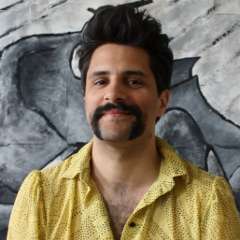This is exactly the sort of programme that the good people of Unerhörte Musik excel at. Six pieces from as many composers – all either new, nearly new or rare classics. Putting together a show for solo soprano and electronics can’t be easy, but this felt like a programme made especially for the talents of Sirje Viise alone.
The first piece was by Vinko Globokar – everybody’s favourite French avant-garde trombonist. Being the only item without an electronic element, this was a brazen and exposed opening work. As a showpiece it served as the ideal way for us to experience Viise's resplendent brilliance and acrobatic virtuosity. Comprising a litany of witty vocal sounds, we heard ‘inward singing’, multiphonics, humming and stratospheric squeals. Without appropriate structure there is always the danger of merely shoe-horning fanciful techniques to no purpose other than showing off. Not the case here, folks.
Next: Pop Tart by Mathias Monrad Møller. A dance routine worthy of a young Britney Spears. A dramatic posture held in mockery of self (sexually) satisfied pop star sirens. Electronic sounds splurted forth, tension was built, broken, rebuilt and and rebroken. What did we just see? Not sure, NEXT!
The third item on the bill was John Cage’s Aria with Fontana Mix. Like you, I have seen that title written down so often that I was expecting the piece to be an old familiar friend. Incorrect! With Cage’s signature blend of the entirely-arbitrary-seeming and the probably-deliberate-feeling, the sound world was that of a collage made of a patchwork, looked at through a kaleidoscope. The score consists of superimposed manuscripts and transparent graphic cyphers, with the musical result (plus prerecorded elements) sounding precisely analogous to that kind of wonderment.
Some people say that Alexander Schubert is the new Schubert. You’d be a fool to disagree. His piece Your Fox’s, a Dirty Gold may have a very clunky title indeed, but the music is spectacular. A choreographed work in which the electronic music is not merely synchronised with the physical movement of the body but is actually triggered by its presence. There were lights. There was smoke. There were rebellious slogans chanted in crude language. It was ALL going on. Viise brandished a guitar that was hooked up to some 'de rigueur' electronic triggering system that allows every strum and gesture to create a new sound or stop it dead in its tracks. A highly impressive business, and arresting as much for its technological mastery as for its musical imaginings and theatrical flair.
The best piece of the night, for me, was Simon Steen-Anderson’s Difficulties Putting It Into Practice. A duet for one. What does that mean, you enquire? Well, Viise had filmed herself performing one half of the score and as she played that video back to the audience she sat with her back facing us to watch it and carry out the second part of the score in contrapuntal tandem. This all sounds far more complex than it was. The score itself was no cake-walk, in fact, this is where the real drama of the piece lay, as the video of Viise was projected so big that every eyeball movement of hers could be observed in high definition – the excitement, the panicking, the searching, seeking eyeball – galloping forwards into the music and beyond. And what music it was! Here was another score that took the ‘singing’ part of the soprano voice as a mere fragment of the possible range available to the performer, with too many intricate sounds to possibly describe in print.
The final piece, by Olga Neuwirth, was from 1998 but felt in some ways like it was the oldest of the lot. Singing on top of a fixed audio backing, vocal lines felt inflexible compared to the rest of the wild programme, and some of the ‘sound effects’ felt like they may have belonged on the original Doctor Who TV show.
But what matter? A commanding performance of a stunning programme. One could even venture that there was a refreshing lack of masterpieces on offer – after all, not every concert has to pose as anything other than a collection of really fascinating music.


